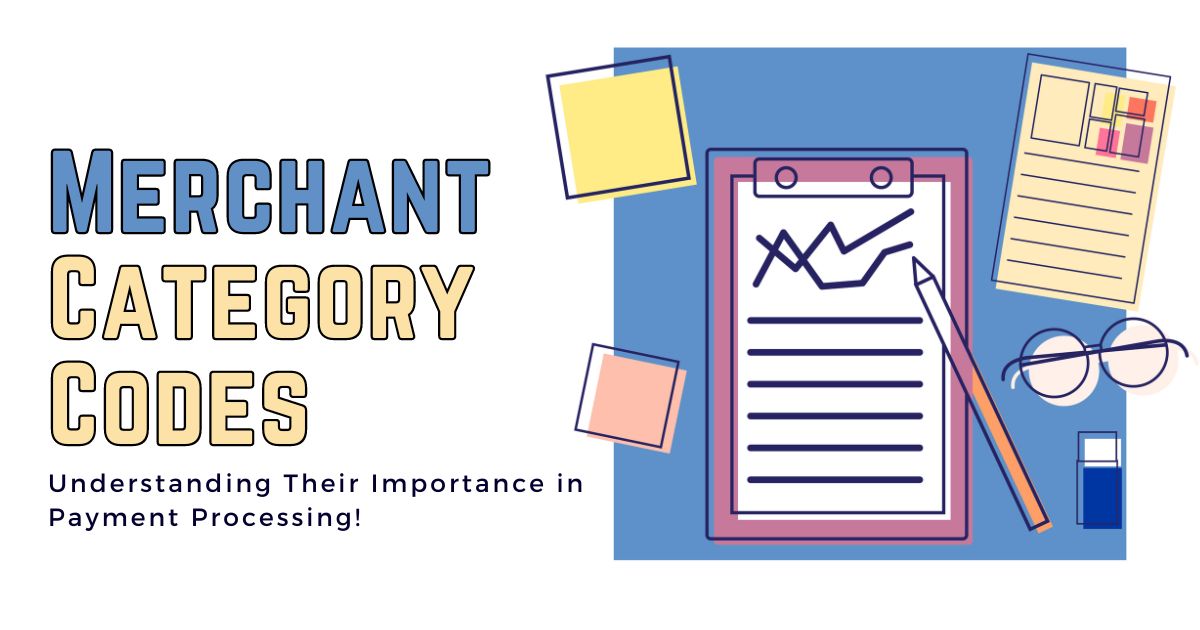
| May 6th, 2024 |
Demystifying Merchant Category Codes — Understanding Their Importance in Payment Processing!
Merchant Category Codes (MCCs) serve an important role in the complex world of payment processing, yet they are sometimes overlooked or misinterpreted. These numerical identities are critical for categorizing enterprises according to the items or services they provide. Understanding MCCs is critical for streamlining transactions, complying with regulations, and collecting insights into consumer behavior, whether you are a large retailer or a small vendor.
What are Merchant Category Codes?
Merchant Category Codes, or MCCs, are four-digit numbers provided to firms by credit card networks like Visa, Mastercard, American Express, and Discover. These codes identify merchants according to the type of their business activity. Each MCC represents a certain industry or kind of service, allowing financial institutions and payment processors to precisely identify transactions.
The Importance of MCCs in Payment Processing —
1. Transaction Processing:
MCCs help to simplify transaction processing by clearly identifying businesses. When a customer makes a purchase, the MCC associated with the merchant is sent along with the transaction information. This information enables banks and payment processors to route transactions more effectively and precisely.
2. Fee Determination:
Interchange rates, which retailers pay to card-issuing banks to process transactions, may vary between MCCs. Understanding the applicable MCC and associated fees is critical for firms looking to manage their payment processingcosts properly.
3. Fraud Prevention:
MCCs can also help prevent and detect fraud. Financial institutions can detect potentially fraudulent activity or transactions that differ from regular spending patterns by evaluating transaction data and comparing it to known MCCs connected with legal organizations.
How MCCs Impact Businesses and Consumers —
1. Business Operations:
For merchants, the proper assignment of MCCs is critical for accurately reporting revenue, managing expenses, and meeting regulatory requirements. Furthermore, enhancing MCC classification can help firms get better payment processing rates and increase overall profitability.
2. Consumer Experience:
MCCs have an indirect impact on consumers since they influence the availability of specific payment alternatives and reward programs. For example, credit card issuers may provide additional points or cashback incentives for transactions made at merchants in specified MCC categories, such as restaurants or gas stations.
3. Regulatory Compliance:
Certain industries, such as gambling, tobacco, and adult entertainment, face governmental restrictions or increased scrutiny due to the nature of their operations. Proper MCC classification assures compliance with regulatory rules and reduces the possibility of fines or penalties for noncompliance.
Challenges and Considerations —
1. MCC Misclassification:
Incorrect or obsolete MCC assignments can cause transaction problems, increased processing fees, and compliance difficulties. Businesses must examine and update their MCC classifications on a regular basis to maintain correctness and compliance with current operations.
2. Evolving Business Models:
As industries change and new business models arise, the current MCC framework may become obsolete or inadequate. Payment industry stakeholders must respond to these changes by modifying MCC standards and adopting new codes to reflect evolving businesses and trends.
3. Cross-Border Transactions:
Cross-border transactions pose particular issues in the global marketplace, including MCC classification, currency translation, and regulatory compliance. Businesses involved in foreign trade must negotiate this complexity to ensure smooth transactions and reduce risks.
Who Assigns Merchant Category Codes?
Credit card networks like Visa, Mastercard, American Express, and Discover assign merchant category codes (MCCs). These networks develop norms and criteria for categorizing merchants based on their main business activity. MCC assignments are relied on by financial institutions and payment processors to appropriately process transactions and apply appropriate fees.
List of Common Merchant Category Codes —
Here is a selection of commonly used MCCs along with their corresponding categories:
| MCC | Description |
| 5411 | Grocery Stores, Supermarkets |
| 5812 | Eating Places, Restaurants |
| 5541 | Service Stations (with or without Ancillary Services) |
| 5814 | Fast Food Restaurants |
| 5912 | Drug Stores, Pharmacies |
| 5813 | Drinking Places (Alcoholic Beverages) |
| 5999 | Miscellaneous and Specialty Retail Stores |
| 5732 | Electronics Stores |
| 7299 | Miscellaneous Personal Services |
| 6011 | Financial Institutions – Manual Cash Disbursements |
This table provides a clear overview of each Merchant Category Code alongside its corresponding description or category.
This is just a small sample of the extensive range of MCCs that cover various industries and services.
High-Risk Merchant Category Codes —
Certain MCCs are associated with high-risk businesses due to variables like as increased regulatory scrutiny, higher chargeback rates, or a higher possibility of fraudulent activity. Examples of high-risk MCCs include:
| MCC | Category |
|---|---|
| 5967 | Direct Marketing – Inbound Telemarketing Merchants |
| 5966 | Direct Marketing – Outbound Telemarketing Merchants |
| 7995 | Betting, including Lottery Tickets, Casino Gaming Chips, Off-Track Betting, and Wagers at Race Tracks |
| 7841 | Video Game Arcades/Establishments |
| 7273 | Dating and Escort Services |
Businesses operating in these high-risk categories may experience higher difficulty in obtaining payment processing services, as well as increased scrutiny and compliance requirements from financial institutions and regulatory agencies.
Conclusion —
To summarize, Merchant Category Codes (MCCs) are numeric identities provided to firms by credit card networks that categorize them based on their major activity. MCCs play an important role in the payment processing ecosystem by processing transactions, determining fees, and preventing fraud.
Understanding MCCs is critical for businesses to streamline payment processes, comply with regulations, and efficiently manage risks. High-risk MCCs, such as those related to telemarketing, gambling, and adult services, require special care owing to increased scrutiny and compliance requirements.
Businesses can use MCCs strategically to streamline transaction processing, improve the customer experience, and assure regulatory compliance. Stay updated about MCC classifications, adhere to industry standards, and use MCCs to open growth prospects in the ever-changing commercial world.
